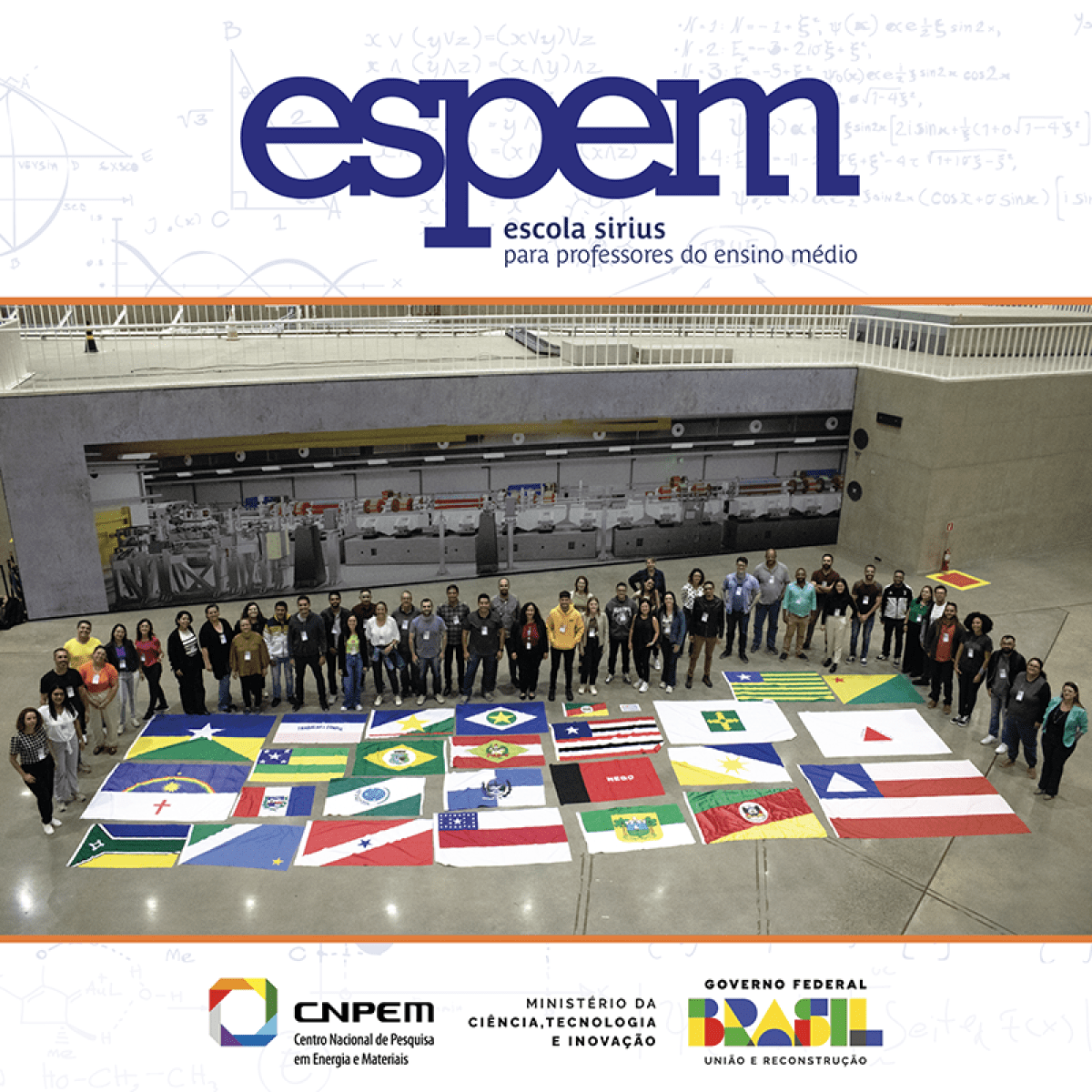
Participants of the Sirius School for High School Teachers (ESPEM) in the experimental hall of Sirius
40 high school teachers gathered for a week of immersion in the cutting-edge research and development environment at the Brazilian Center for Research in Energy and Materials (CNPEM)
The fifth edition of the Sirius School for High School Teachers (ESPEM 2023), organized by CNPEM in partnership with the Brazilian Physical Society (SBF), was held July 17–21 in Campinas, São Paulo.
For the first time, this event brought together representatives from all Brazilian states as well as the Federal District among the 40 high school physics, chemistry, and biology teachers who were chosen from 349 applicants. Of the final 40, 85% teach in state or municipal public schools, while 15% work in private or federal public institutions. The region with the greatest representation was the Northeast, with 11 teachers. Since its first edition in 2019, the ESPEM event has served over 500 teachers from municipal, state, federal, and private schools throughout the country.
“If I had to define it in a word, it would be valued. Teaching is not easy, considering the issues involved in our training and work. We have few opportunities to meet trained researchers. So to be selected to spend time with these professionals, learning directly from them in person, is even more incredible. We feel even more valued, since they are looking at us, recognizing us and saying that our training is important,” said Naielly Rodrigues, a biology teacher in Cuiabá, Mato Grosso.
The ESPEM program offers theoretical and hands-on classes led by CNPEM staff and guest lecturers from the areas of education and science in order to encourage educators to bring ideas from modern science back to their classrooms. The program is free and involves 40 hours of activities including visits and seminars on relevant and current topics with strong social impact that support the teachers as they develop new language and tools to apply this knowledge in their own teaching practice.
The schedule includes an introduction to the Sirius synchrotron light source (which the event is named for) and the science and technology of particle accelerators, synchrotron light production, and its applications. There are also seminars in the areas of bioscience, nanotechnology, and biorenewables, as well as visits to the National Laboratories and an overview of the interdisciplinary undergraduate course in science, technology and innovation offered by CNPEM, the Ilum School of Science. The ESPEM program also provides a space for discussions among the participating teachers to encourage contacts and exchanges of ideas with colleagues from across Brazil.
“Teachers have a social function, to participate in a training like this and return to society and, in my case, to the school where I work. I see my students’ eyes light up when I come back from congresses or events like these. Seeing that my experiences motivate the students to want more, and often they try to change their own reality, it’s incredible,” notes Bárbara Castro, a physics teacher in Óbidos, Pará.
More than just a public outreach initiative for Sirius and CNPEM, the ESPEM program has the potential to be a turning point for the teachers who participate: in their training and in their practice inside and outside the classroom.
With a sophisticated and vibrant environment for research and development that is the only one of its kind in Brazil and found in only a few scientific centers in the world, the Brazilian Center for Research in Energy and Materials (CNPEM) is a private, non-profit organization overseen by the Ministry of Science, Technology and Innovation (MCTI). The Center operates four national laboratories and is home to Sirius, the most complex project in Brazilian science and one of the world’s most advanced synchrotron light sources. CNPEM is home to highly specialized multi-thematic teams, globally competitive lab infrastructure that is open to the scientific community, strategic lines of research, innovative projects in partnerships with the productive sector, and training for researchers and students. The Center is an environment driven by research into solutions that impact the areas of health, energy and renewable materials, agri-environmental, and quantum technologies. In 2022, with support from the Brazilian Ministry of Education (MEC), CNPEM expanded its activities with the opening of the Ilum School of Science. This interdisciplinary undergraduate program in science, technology, and innovation implements innovative ideas to provide a high quality free and full-time undergraduate program immersed in the research environment at CNPEM. The CNPEM 360 Platform provides visitors with a virtual immersive visit to the Center’s main environments and activities. Visit at: https://pages.cnpem.br/cnpem360/
Craievich played a key role in creating and developing the LNLS and building a community of researchers with the proficiency to use the Southern Hemisphere's first synchrotron.
Free event on June 17 with a visit to Sirius and activities for everyone at the CNPEM campus in Campinas, São Paulo